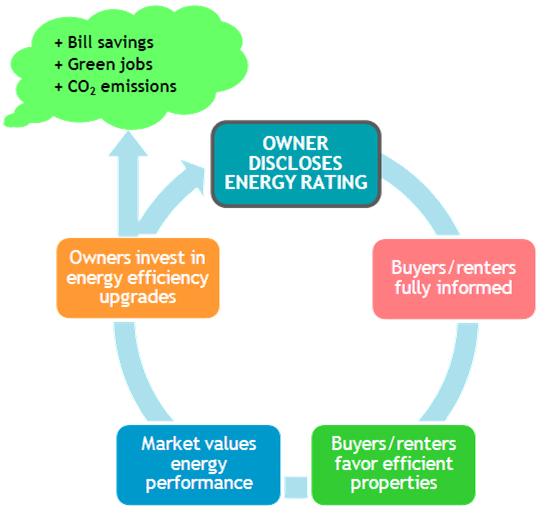Valuing building energy efficiency through rating and disclosure
A new report finds policies that disclose a building's energy use can be effective in getting markets to value energy efficiency, create jobs, and reduce greenhouse gas emissions
Published 02-10-10
Submitted by Northeast Energy Efficiency Partnerships
 Benefits of Building Energy Rating Systems
Benefits of Building Energy Rating SystemsNortheast states could greatly increase the energy efficiency of homes and buildings through a public policy requiring the rating and disclosure of a building’s energy performance, according to a new report commissioned by Northeast Energy Efficiency Partnerships (NEEP), http://www.neep.org.
The NEEP report, Valuing Building Energy Efficiency through Disclosure and Upgrade Policies: A Roadmap for the Northeast U.S., lays out a guide for implementing two key tools as part of a building energy rating system:
- Mandatory building energy disclosure policies which seek to better inform the housing market by requiring information about building energy performance be disclosed to potential buyers, renters and the public; and
- Mandatory upgrade policies which would require adoption of certain cost-effective energy efficiency measures in relation to that disclosure.
Residential and commercial buildings account for approximately 40 percent of U.S. greenhouse gas emissions and total energy consumption, according to the U.S. EPA(1). The potential for generating as much as 17 percent(2) in energy savings through retrofits in existing buildings is why NEEP is calling on states in the Northeast to adopt mandatory building energy rating systems.
"Whether it's a washer and dryer, or a car, many consumers will consider the energy efficiency of these products before buying one," says NEEP's public policy director, Jim O'Reilly. "However, the disclosure of this basic information for a home, probably the largest investment any of us will ever make, is not required at any point during the time of sale. Buyers are left in the dark about what it costs to actually operate a home."
Energy performance disclosure gives consumers the tools to make informed choices and protect themselves against poor buildings and building components, higher-than-anticipated energy bills, discomfort, or unplanned renovation needs. Building energy rating also provides a market-based mechanism for creating a common currency regarding home or building energy use, according to Susan Coakley, NEEP's executive director.
"As energy prices go up consumers are increasingly scrutinizing the costs to operate an appliance, as well as the price tag," Coakley adds. "Energy ratings systems such as ENERGY STAR® are an effective way to easily communicate the cost to run an appliance to consumers. With buildings, we should have a similarly easy way to communicate their energy use."
In addition to a reduction in energy consumption, the report states that mandatory disclosure and upgrade policies will also stimulate the creation of numerous jobs as demand for both energy auditors and contractors who can install the recommended upgrades will increase significantly. As the market's value of energy performance increases, society as a whole will benefit in the form of greater energy independence, lower utility bills, decreased greenhouse gas emissions, increased real estate values and stronger local economies.
First adopted over a decade ago in Australia and Denmark, mandatory building energy rating policies are now in place in more than 30 countries worldwide and are in place in some form or other in California, Nevada, Washington, Oregon, New Mexico, and, most recently, in New York City, which in December enacted a landmark measure to require building benchmarking and labeling. In addition, the U.S. Department of Energy is currently charged with developing a model building energy rating system that can be used by states in setting their own building energy rating policies. NEEP's report provides a guide for Northeast states considering the adoption of building energy rating policies by highlighting global case studies where such policies are already in place, and by identifying possible obstacles and tactics for overcoming these. The guide helps ensure that the policies themselves are designed in such a way as to be effective in adding real value to consumers, in achieving cost-effective energy savings, and in avoiding needless costs and disruptions.
"This report marks a first step toward introducing building energy rating as a much-needed public policy for Northeast states," adds O'Reilly. "As the report spotlights several case studies where similar systems are running successfully around the world, we look forward to working with stakeholders across the region to develop a system that works for their states."
To find out more and download the report, Valuing Building Energy Efficiency through Disclosure and Upgrade Policies: A Roadmap for the Northeast U.S., click here (http://neep.org/public-policy/building-energy-rating).
(1) EPA, 2009. U.S. Greenhouse Gas Inventory Report, http://epa.gov/climatechange/emissions/usinventoryreport.html
(2) NEEP, 2005. Economically Achievable Energy Efficiency Potential in New England, http://neep.org/uploads/policy/Updated_Achievable_Potential_2005.pdf
ABOUT NEEP
NEEP is a regional nonprofit that promotes the efficient use of energy in homes, buildings and industry across the Northeast U.S. We advance cutting-edge products and practices through coordinated, whole-building efficiency programs and policies. NEEP advocates for energy efficiency as leading clean energy resource that creates a stronger economy, a cleaner environment and a more reliable and affordable energy system. For more information, visit www.neep.org.

Northeast Energy Efficiency Partnerships
Northeast Energy Efficiency Partnerships
For the industry, communities, businesses, and policy makers in the Northeast & Mid-Atlantic regions, NEEP is a non-profit organization that transforms the way we use and think about energy. We work in the region to remove the greatest barriers to the advancement of energy efficiency and make visible its impacts on the region, economy, the planet. We focus on areas where energy efficiency can have the most immediate and largest impact: reducing energy in buildings, speeding the adoption of smart products, and advancing knowledge and best practices. Our unique approach brings together all stakeholders through education, advocacy, and collaboration - three powerful ingredients essential to true market transformation.
More from Northeast Energy Efficiency Partnerships

